Celebrating Black Birders Week: A Conversation
For immediate release ‐ June 02, 2022
Contact: Micah Beasley, 919.707.9970. Images available upon request
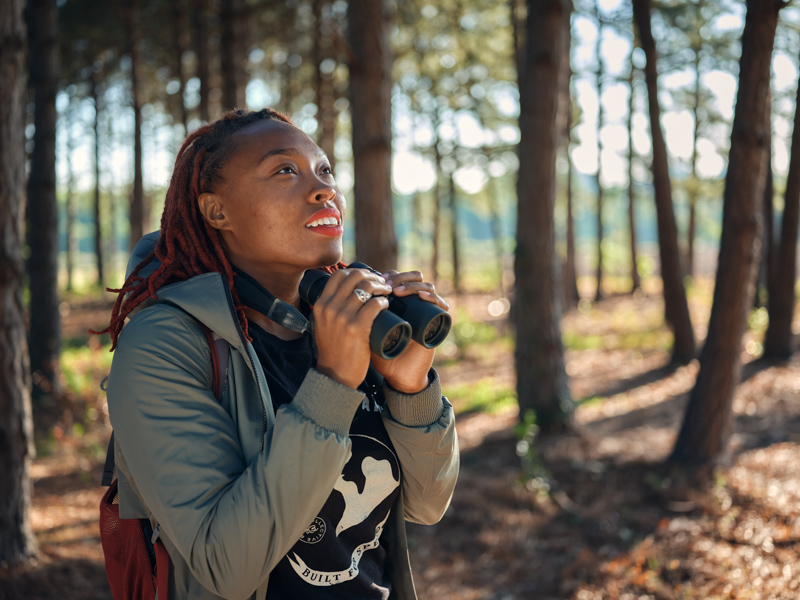 Deja Perkins leading a birdwatching tour. Photo: Justin Cook.
Deja Perkins leading a birdwatching tour. Photo: Justin Cook.
By Micah Beasley, PR & Marketing Coordinator
To celebrate Black Birders Week (May 29–June 4, 2022) the Museum was happy to partner with urban ecologist and movement co-organizer Deja Perkins for bird walks at our Prairie Ridge location in Raleigh and this Saturday, June 4 at Jones Lake State Park in Elizabethtown, NC.
After Deja’s bird walk at Prairie Ridge on Sunday, May 29, the Museum’s PR & Marketing Coordinator Micah Beasley sat down with her to have a conversation about the importance of this social justice movement. Some parts of the conversation have been edited for brevity.
MICAH BEASLEY: What inspired you to help establish Black Birders Week?
DEJA PERKINS: Black Birders Week was a last-minute initiative that sprung up in response to Christian Cooper’s incident in the Ramble at New York’s Central Park. A group of Black naturalists came together to share in the trauma of Cooper’s experience, because we all had similar experiences in the outdoors — instances where we weren’t believed, we weren’t taken seriously as an expert, had police called on us while we were doing field work or simply experienced some form of harassment while we were trying to enjoy the outdoor space. The first year we had about 30 individuals who were helping turn this event around in 48 hours to create this safe space online, where people could connect at a time where people could not connect in person due to the pandemic.
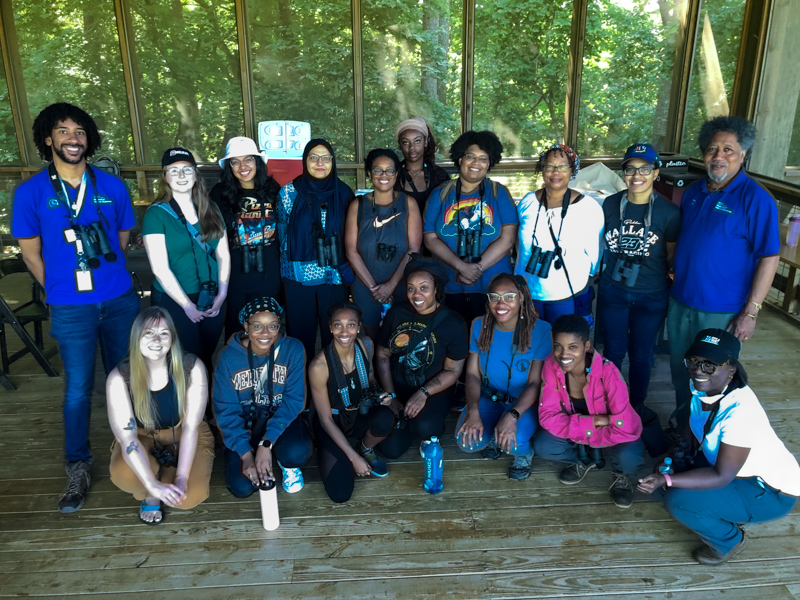 Black Birders Week program group photo at Prairie Ridge. Photo: Micah Beasley/NCMNS.
Black Birders Week program group photo at Prairie Ridge. Photo: Micah Beasley/NCMNS.
MICAH BEASLEY: What is the primary mission of Black Birders Week?
DEJA PERKINS: Visibility, learning and connection. Initially, this event was birthed out of a place of trauma, but the second year really transformed into a place of joy. We focused on Black joy in the outdoors, how you can get into birding, what are the tools you can use, how to be safe in the outdoors, and who are the people you can engage with. In 2022, we are focusing on “Soaring to Greater Heights,” and we are focusing on highlighting the mental health benefits of birding, networking, intergenerational learning and social connection.
MICAH BEASLEY: You’ve used the phrase “Black joy” throughout today, can you define what it is?
DEJA PERKINS: There’s a stereotype that Black people don’t like to go outside or that Black people don’t do things outside, that we don’t find joy in nature. To an extent that may be true for some individuals as there is a lot of trauma in the outdoors related to people of Black descent from slavery, from having to work outside for someone else for years with no payment, being hunted in the woods or forests, and having our people strung up from trees. On the other hand, there are also a lot of Black people who have grown up living off the land, who have grown up hunting, birdwatching, foraging. We have our own history with the land before that history was taken from us and we were forced into labor.
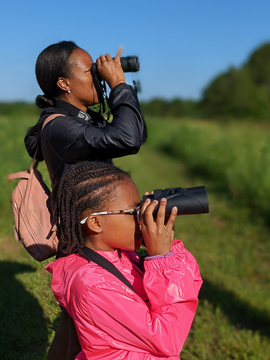
Mother and daughter birdwatching with binoculars. Photo: Michael Lewis/NCMNS.
So, Black joy in the outdoors is about eliminating fear, reconnecting with the land, and most importantly showcasing the peace and joy we find in the outdoors. I believe Black joy in the outdoors is also a form of environmental justice. For instance, when we think about environmental justice projects, we often think about air and water pollution, right? But being able to have access to a natural space, to enjoy that space, and be allowed to find fun and joy in outdoor recreation — that is also a form of justice. That is something that we have been denied and historically excluded from because we either haven’t had access to a lot of natural spaces (beyond grass football fields) or we haven’t had equal access to quality natural spaces. Why are the parks in minority communities mostly grass fields for football/soccer? We should have the opportunity to be exposed to other forms of recreation in our communities because we enjoy bird watching, hiking, biking, kayaking etc. too!
MICAH BEASLEY: What are some of the current challenges that Black birders face today when engaging with natural spaces?
DEJA PERKINS: I think that one of the biggest barriers for Black people is direct access to natural spaces. Another challenge is that other people don’t often view Black naturalists as a voice of authority because they don’t normally see Black people represented as voices of authority in many spaces and that translates doubly to the outdoors. There are still people who think we don’t belong there. That’s a big challenge that we still have to overcome when we’re outside. We want to be viewed as a regular person, a person just like everyone else. We want to be viewed as belonging.
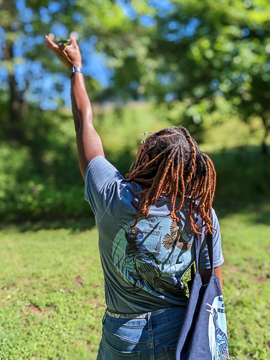
Program leader Deja Perkins playing calls and songs of the Indigo Bunting (Passerina cyanea) to draw out one sighted along the walk. Photo: Michael Lewis/NCMNS.
MICAH BEASLEY: What are the roles institutions like the Museum play in advancing racial equality?
DEJA PERKINS: There are a lot of steps that institutions can take, starting with events like this morning at Prairie Ridge and providing a safe space for Black people to recreate and experience outdoor activities. It’s also important to engage with local experts, contract local Black naturalists to come in and lead walks or programming, so that they can reach out to their community and bring people in, who perhaps have never tried something like a bird walk.
MICAH BEASLEY: What do you hope Black Birders Week looks like ten years from now?
DEJA PERKINS: I hope Black Birders Week remains something where people can network and engage with one another, reflect and build community during this week-long period. That’s the most important thing about this week, that it amplifies voices that may have been hidden and it provides an opportunity for people to connect and try something new.
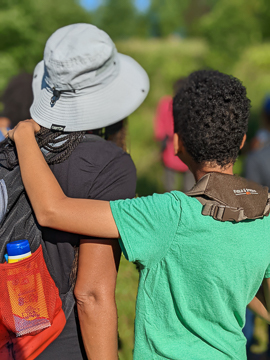
A mother and child survey the landscape of Prairie Ridge for birds. A focus of Black Birders Week is intergenerational learning. Photo: Michael Lewis/NCMNS.
MICAH BEASLEY: What about birds can unite humans?
DEJA PERKINS: The fact that birds are everywhere. I think everybody loves birds to some extent because they’re so beautiful and easy to observe. You can see them anywhere, and because they migrate, a lot of times you can see the same birds as someone else even though you may live in a different state. It’s not like you’re going to see these huge charismatic species like bears and lions everywhere, but birds? You can always see birds anywhere you go.
MICAH BEASLEY: Why do you love birds?
DEJA PERKINS: That is the easiest and hardest question. I love birds for so many reasons. One, because they’re beautiful, and two, because they remind me that the world is so much bigger than myself. For me, birdwatching is not just about identification, it’s about being observant and realizing that there are other things that exist in the same space. Birds are using the same habitat and the same ecosystem that I’m in. Birds help me become more observant about my local environment and bring understanding that the world is not just about me, it’s so much bigger than me, so much bigger than the both of us sitting here — they remind me that we as people are stewards of this place and that as citizens of the Earth we are supposed to be caretakers and helping make sure that what we’re seeing today can be seen for future generations.
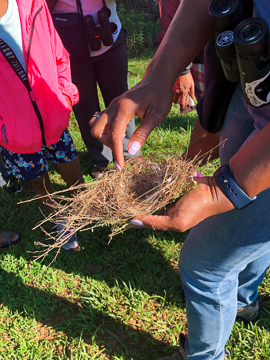
Deja Perkins showing participants a bird nest.
Photo: Michael Lewis/NCMNS.
MICAH BEASLEY: Anything else you’d like to share?
DEJA PERKINS: I would encourage everyone to just try birdwatching. Take ten minutes, sit outside, whether that’s in your yard or a natural space where you feel safe. Be still and quiet, notice what’s going on around you. Be a little more observant of the natural world.
Hear more from Deja! Perkins was a guest on the Museum’s Love Nature podcast during season one. Listen to Deja Perkins’ episode now.
You can also follow Deja Perkins on Twitter @naturallywild__.
For more information about our upcoming activities, conservation news and ground-breaking research, follow @NaturalSciences onInstagram,TwitterandFacebook.Join the conversation with #visitNCMNS.

